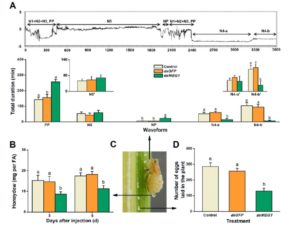A salivary endo-β-1,4-glucanase acts as an effector that enables the brown planthopper to feed on rice
 The rice brown plant hopper (BPH) Nilaparvata lugens is a damaging herbivorous insect that sucks nutrients from phloem. Previously, Ji et al. surveyed genes encoding putative secreted proteins from the BPH salivary gland and identified NlEIG1 as a putative endo-β-1,4-glucanase (cell-wall degrading enzyme). In this new work they showed that NlEIG1 is introduced into plant cells during feeding, and that when the NlEG1 gene is silenced through RNAi the insects show impaired feeding and fecundity. Ji et al. further examined insect feeding behaviour through an electrical penetration graph (EPG) and found that NlEIG1-silenced individuals spent more time in the pre-penetration phase and less in the feeding phase. The authors propose that NlEIG1 supports insect feeding by degrading cell walls. These findings provide an opportunity to address the damage caused by rice brown plant hopper. Plant Physiol. 10.1104/pp.16.01493
The rice brown plant hopper (BPH) Nilaparvata lugens is a damaging herbivorous insect that sucks nutrients from phloem. Previously, Ji et al. surveyed genes encoding putative secreted proteins from the BPH salivary gland and identified NlEIG1 as a putative endo-β-1,4-glucanase (cell-wall degrading enzyme). In this new work they showed that NlEIG1 is introduced into plant cells during feeding, and that when the NlEG1 gene is silenced through RNAi the insects show impaired feeding and fecundity. Ji et al. further examined insect feeding behaviour through an electrical penetration graph (EPG) and found that NlEIG1-silenced individuals spent more time in the pre-penetration phase and less in the feeding phase. The authors propose that NlEIG1 supports insect feeding by degrading cell walls. These findings provide an opportunity to address the damage caused by rice brown plant hopper. Plant Physiol. 10.1104/pp.16.01493




Leave a Reply
Want to join the discussion?Feel free to contribute!